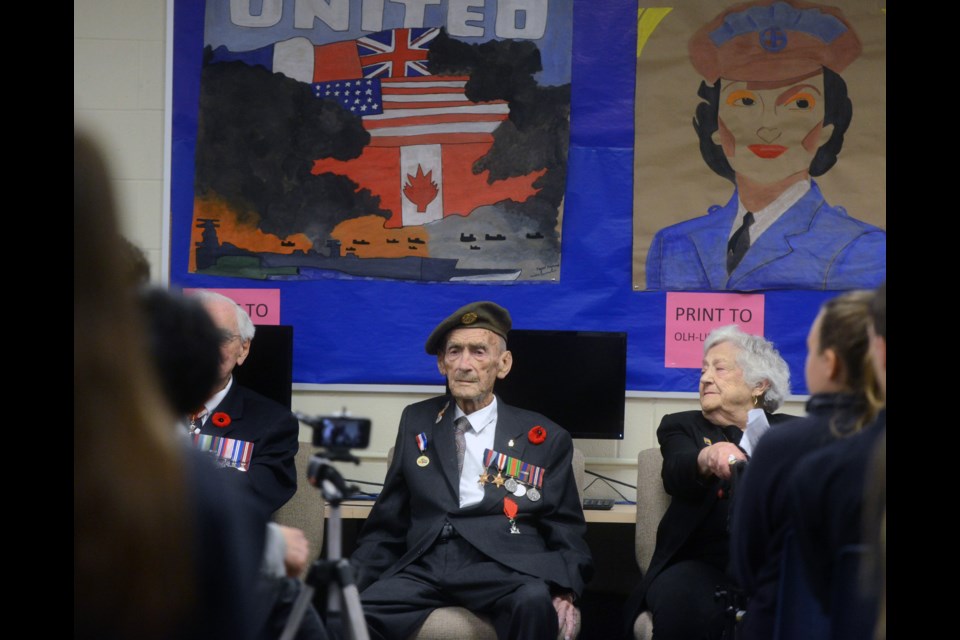Students at a Guelph high school were told Thursday that no one that ever went to war thinks it’s a good thing.
“One of the silliest things millions of men and women ever did was go to war,” Bill Winegard told about 100 Our Lady Of Lourdes students.
Winegard served in the Royal Canadian Navy during World War II.
“I often sat there and thought ‘what in Heaven’s name are we doing? Surely there was a better way than to go around killing all my friends,” said Winegard.
“Anybody that says ‘I enjoyed the war,’ I would like to talk to them. Because I didn’t. I did what I had to do and I think I did it well … but no one that went through war who was shot at or was shooting at someone thought it was fun.
“What a terrible way to spend any part of your life.”
Winegard later went on a journey to visit the war graves of all those he knew, to France, Belgium and Holland.
“What a terrible month it was,” he said.
Winegard was one of seven veterans who spoke at the event organized by teacher Paul Zuccala with the help of board trustee Joe Tersigni as part of Remembrance Day activities, giving students a chance to hear about the experience of war from those that lived it first-hand.
He was joined by Moe Ferris (Royal Canadian Navy, peacekeeping), Michael Seitz (Royal Canadian Air Force, peacekeeping), Eleanor ‘Bobby’ Freeman (Canadian Women’s Army Corps, World War II), Frank Taylor (Canadian Army Corps, World War II), Frank Bayne (Canadian Army, Korean War) and Gerry Conway (U.S. Army, Vietnam War).
Three of those veterans – Winegard, Freeman and Taylor – are now in their 90s.
Conway was attending university in the United States on an athletic scholarship when the Vietnam War broke out and eventually enlisted in the U.S. Army’s airborne division.
The memory he shared with the students on Thursday was not of what happened during war, but what happened when it ended.
It was a bright sunny day in San Diego when he and his unit returned from his second tour of duty in Vietnam. But before they marched through the gates of the army base they were told to put their rain slickers on.
“As we marched out of this particular barracks there was a crowd at the gate and there had to be 1,000 people there,” Conway said.
“People threw everything on us. They threw coffee, pop, they spat on us, they threw urine on us, they assaulted us, they did everything they could possibly do,” Conway said, remembering calls of ‘who did you kill today?’ and ‘baby killers!’ being hurled at them.
“We expected to come home from Vietnam, not necessarily as heroes, but not necessarily as fodder,” Conway said. “That always stayed in my mind as my primary thought of Vietnam.”
Freeman, who drove trucks and staff cars during her tenure in the Canadian Women’s Army Corps, put a lighter side on the discussion when she told the students she just wanted to show that women were good for “more than the kitchen and the bedroom.”
She said women who took over men’s roles while they were away fighting were “trailblazers” in proving they had the skills and determination to do those jobs.
“I was in tears most of the time, I lost so many friends,” including a brother in the air force who was shot down and killed and another brother who became a prisoner of war, Freeman told the students.
Peacekeepers Seitz and Ferris talked of the dangers of that task.
“Peacekeeping is a tenuous and a dangerous job,” Seitz said, telling the students of a plane shot down even after identifying itself as a peacekeeping mission.
“The rules of engagement (during peacekeeping missions) are not clear, but they certainly do not favour the peacekeeper,” Seitz said.
Bayne remembered being in charge of four artillery pieces that once fired 1,200 rounds in one night at the enemy.
“The only way to stop the enemy was to call down artillery fire on ourselves,” he said.
None of the veterans had any regrets about serving in the military, but none of them glorified their experience in the military in any way, shape or form.
“It’s futile. The only people that want war are people who never went to war,” Conway said.
